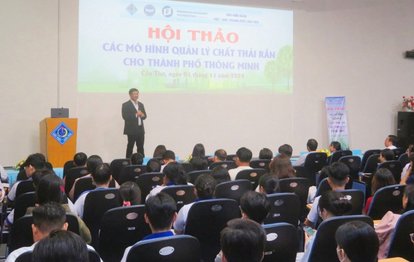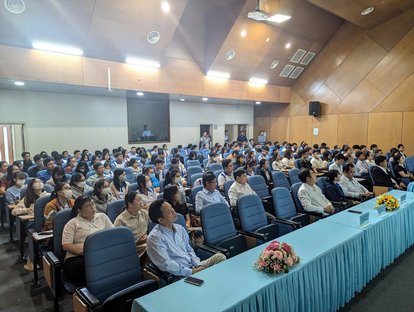Smart City
Promoting Smart City Models through Solid Waste Management

Workshop “Solid Waste Management Models for Smart Cities", Can Tho City, November 2024.
© FNF VietnamCan Tho, November 1, 2023 – In response to the urgent need for solutions to manage and recycle solid waste, Friedrich Naumann Foundation for Freedom (FNF) in collaboration with the Vietnam Can Tho Union of Friendship Organizations and Can Tho University organized a workshop titled “Solid Waste Management Models for Smart Cities.”
The workshop introduced innovative approaches to applying digital technologies in solid waste management, addressing one of the most pressing challenges in the Mekong Delta region. Statistics show that over 10,000 tons of waste are generated annually in the region, 88.3% of which is household waste. However, only 49% of this waste is collected and processed, leaving 51% to escape into the environment, causing pollution, waste of resources, and direct harm to public health.

The workshop introduced innovative approaches to applying digital technologies in solid waste management.
© FNF VietnamDigital Technologies: A Key to Waste Management Solutions
Speaking at the workshop, Ms. Le Thuy Ngoc Lan, Vice President of the Can Tho Union of Friendship Organizations, emphasized: “Pollution from solid waste is a critical issue, not only in Vietnam but also in many developing countries. Through the collaboration between FNF and scientists at Can Tho University, this workshop offers opportunities to implement technological solutions to turn solid waste into resources, contributing to sustainable development.”
Several cutting-edge technological solutions were proposed at the workshop, including:
- Smart waste collection systems: Optimizing sorting and recycling processes through artificial intelligence (AI) and robotic systems.
- Automated waste processing at plants: Robots handle sorting processes, minimizing health risks for sanitation workers and reducing costs for hazardous work allowances.
- Harnessing compressed gas from waste: Leveraging technology to convert compressed gases generated during waste processing into energy for infrastructure projects, reducing emissions and conserving resources.
These solutions aim to enhance waste management efficiency, save resources, and increase the sustainability of solid waste management systems.

The workshop brought together researchers and policymakers in Can Tho's environmental and urban sectors.
© FNF VietnamCommunity Action and Policy Enforcement – A Dual Approach
In addition to technological applications, the workshop highlighted the critical role of legal frameworks in controlling environmental pollution. Strict regulations, combined with community awareness – such as reducing the use of plastic bags, sorting waste at the source, and avoiding littering – are key factors in advancing smart city models.
The workshop underscored a clear message: Solid waste management is not solely the responsibility of authorities but requires the active participation of the entire society. Technology serves as a powerful tool, but behavior changes and synchronized policies are the foundation for building smart, green, and sustainable cities.
